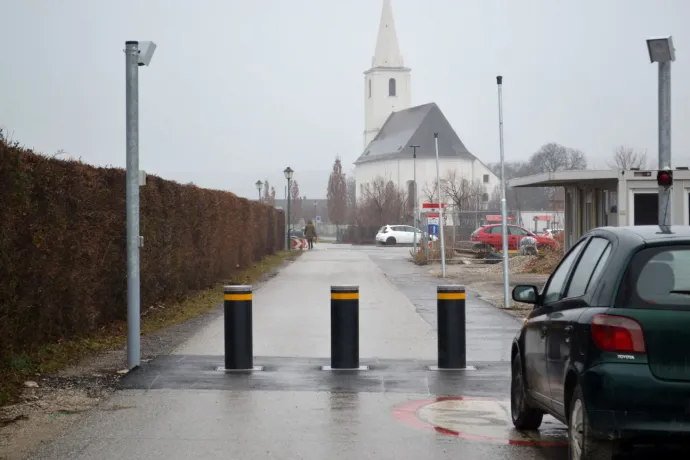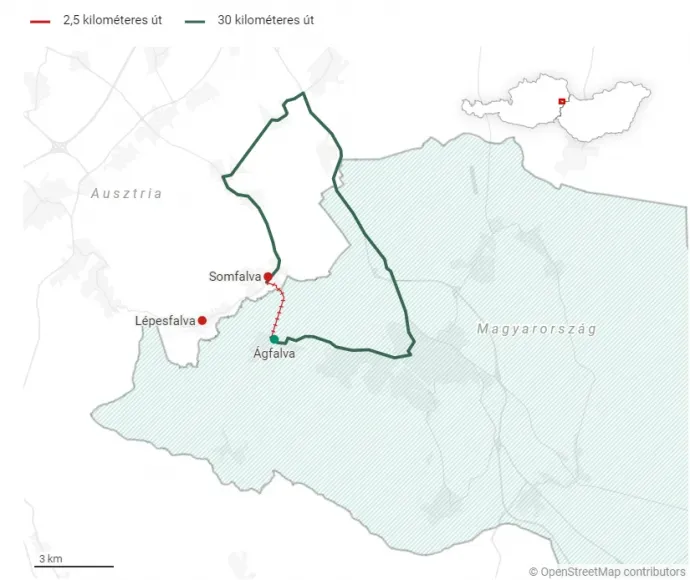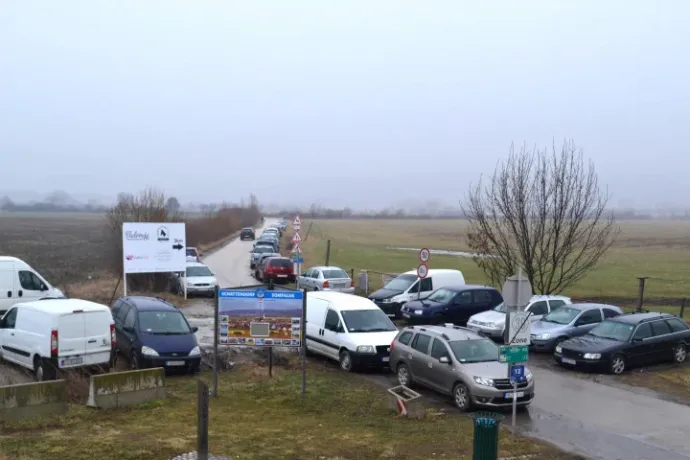Austrian border village forces Hungarian neighbours to 30-kilometre detour

Even if they are willing to pay the neighbouring municipality of Schattendorf for the permit, the residents of Ágfalva, located in Western Hungary are not granted a permit to cross the border into Austria. The leadership of the Austrian municipality closed the local border crossing between Ágfalva and Schattendorf (Somfalva) to cars and lorries with retractable bollards embedded in concrete, making its use conditional on the right reasons and purchasing a sticker.
However, a nearby job across the border is not a sufficient reason for Hungarian applicants, nor is two siblings living in neighbouring villages wanting to visit each other considered reason enough. The distance between them has thus increased from two kilometres to thirty-two. A law firm has taken the issue to court, arguing that the arbitrary restriction on transit violates fundamental EU rights. The case has now been decided at first instance in the Eisenstadt court, not in favour of the Hungarians, but there are still more legal options open.
Although earlier it was said that the permanent residents of Ágfalva, a village near Sopron, would have the opportunity to use the local border crossing at the edge of their village, it has now been revealed that only a few of them have been granted the right to buy an identification sticker from the neighbouring Austrian municipality for 160 euros, which will allow them to cross the border between Ágfalva and Schattendorf by car. The paperwork is also moving slowly. The majority of people only found out last January that they would now either have to walk or cycle to the neighbouring village. Or maybe by motorbike – one lady, for example, was advised to do so when given a negative decision.
The crossing between Ágfalva and Somfalva (Schattendorf)

Shadow Village
Schattendorf literally translates as shadow village, but the historic Hungarian name of the village is Somfalva, which means 'village of dogwoods'. In recent months, however, it has been referred to as the ‘shadow village’, especially by commuters, because the decision by the Schattendorf council has cast a dark shadow over their lives.
It is not only the users of the border crossing who are puzzled as to why the Austrian village was allowed to close the border crossing. After reading our previous report from the border, the international law firm NZP Nagy Legal filed a complaint with the Austrian national court, because they believe that the collection of tolls and the arbitrary selection of people allowed to cross the border violates EU law.
An about-turn after friendship
The Austrian village closed the crossing point on 1 March last year. Local councillors decided to do so because the people of Schattendorf had had enough of the flood of cars from Hungarian commuters. A barrier system linked to a unique ID was installed in the summer and went live on 3 July.
Only one week in, someone vandalised the camera that checks the stickers, while unknown persons vandalised cars left at the border by Hungarian commuters. The friendly embrace between locals of the two villages seen after the fall of communism has now turned into a nasty feud. Despite promises by the mayor to the outraged villagers of Ágfalva that residents with a permanent address could use the route after registering, Schattendorf practically said no. The administration was also slow: according to a report from last December, Schattendorf had issued 300 transit permits, but as these are made out individually, only 25 had been sent out to the people concerned.
Mrs Zoltán Varga would like to travel regularly to Lépesfalva (Loipersbach im Burgenland), which borders both Ágfalva and Schattendorf, and the Austrian town's former mayor even gave her a recommendation letter. However, according to the decision in Schattendorf, the fifty-five-year-old would only be travelling to visit friends, so not only was her application rejected because "there are no important reasons for the journey", but she was even told in the letter to take another route – by motorbike.
"This is absolute nonsense. I don't even have a motorbike!" – Mrs Zoltán Varga was outraged at the answer. It used to take her ten minutes to get across the border to her friends, now it takes 75 minutes by car. Of course, she could use public transport, but the train doesn't stop at Ágfalva, so she would have to catch a bus to Sopron and then take the train.
"It's a huge hassle and a waste of time, I didn't even check the timetable. What I used to do in an hour would now take me a whole day. I'm appealing the decision," the Ágfalva resident said.

The new barrier also separates brothers and sisters
Andrea Némethné Domonkos had a really good reason for requesting the permit. For months, she was quite sure that she would get the €160 sticker. Now it turns out she was very wrong.
"My sister lives in Schattendorf. Our children are the same age, and we often take turns taking care of them, which, besides the emotional connection provided me with a practical reason for requesting the permit. In addition, I work in nearby Pöttersdorf, my husband also works in Austria, but of course, he has not been granted a permit either. I don't know who can cross that barrier if we can't!" – Andrea Némethné Domonkos says. Her sister across the border has also applied for a sticker, but has not yet received a reply. She is thinking of appealing, but they also charge €33 for that, and now she doesn't trust she'd receive a fair decision.
Of course, we wanted to know what reasons the Schattendorf municipality considered acceptable and reasonable, but we received no reply to our letter sent to Mayor Thomas Hoffmann. Nor do the people concerned know of any criteria laid down in a resolution that would determine who can and cannot obtain a transit permit from Europe to Europe.
A lawsuit for damages
The bottom line is that the Schattendorf barrier separates citizens of two EU member states – even if it only applies to their vehicles. This is the view of Máté Ruzicska, a lawyer at NZP Nagy Legal, an international law firm. The firm, which has offices in Nuremberg, Budapest and London, filed a compensation claim against the municipality of Schattendorf after they too had to take a detour because of the barriers. At the end of November, the court in Eisenstadt heard the case, and they received the verdict this Monday.
"The claim for damages was rejected at first instance by the Eisenstadt Provincial Court. If the decision had been in our favour, we would have been able to enforce the financial disadvantages suffered by the people of Ágfalva in a class action for damages," Máté Ruzicska told Telex. The decision of the provincial court is not final, so this possibility is not lost yet.
"The judgment reflects the position of the municipality, which is in stark contrast to the preliminary legal position of the judge in the case, which was announced at the hearing, and it does not primarily examine the regulation about closing the border," said Máté Ruzicska.
According to the law firm, Article 24 of the Schengen Borders Code clearly states that "Member States shall abolish all obstacles to the free movement of persons at internal borders at road crossing points, in particular, speed limits not imposed solely for reasons of road safety."
According to Máté Ruzicska, it is quite clear that the retractable bollards closing the border are an obstacle and that this measure of the Schattendorf municipality is not aimed at ensuring traffic safety but at keeping Hungarian commuters away. "In our view, the court is wrongly separating the question of the unlawfulness of the erection of the retractable bollards from the question of the lawfulness of the construction, since the construction of an unlawful barrier cannot be lawful."
For more quick, accurate and impartial news from and about Hungary, subscribe to the Telex English newsletter!